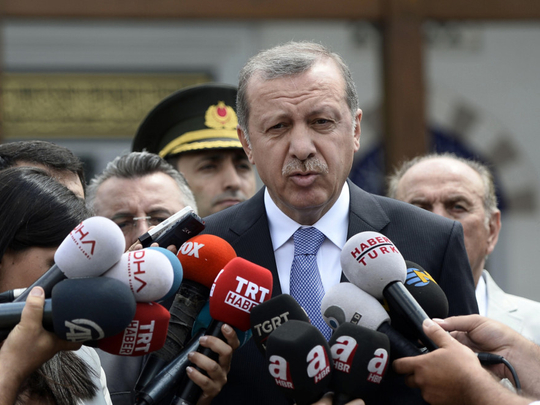
First, the good news. After months of dithering, Turkish President Recep Tayyip Erdogan has given his approval to America to use the Incirlik air base in southern Turkey to mount air strikes against Daesh (the self-proclaimed Islamic State of Iraq and the Levant) positions across the border in Syria.
Nearly a year after coalition planes began bombing Daesh forces in Syria and Iraq, there is already much excitement being expressed in Washington that the Turkish decision could prove to be a game-changer in the campaign to defeat the Islamist menace. It will allow coalition forces to monitor more closely Turkey’s 500-mile (805km) border with Syria, which has been the main conduit through which Daesh has smuggled arms and recruits, as well as enabling American warplanes to respond more quickly against likely Daesh targets.
The bad news, though, is that the Turks’ decision has been somewhat undermined by Ankara’s renewal of hostilities against its long-standing foe, the Syrian Kurds. The Syrian conflict is complicated enough without the Turks confusing matters even more by opening up another front against the Kurds, the majority of whom are seen as vital allies of the West.
On one side you have the Bashar Al Assad regime in Syria, desperately trying to cling to power with the help of its allies in Tehran and the Iranian-backed Hezbollah militia in southern Lebanon. On the other, you have an estimated 1,200 Syrian opposition groups trying to lay claim to Damascus, with Daesh and other more moderate ones, such as the Free Syrian Army, leading the charge.
Amid this chaotic landscape, the Syrian Kurds are one of the few combatant groups that have proved themselves to be heroic allies of the West’s cause. Backed by American air strikes, the Kurds fought valiantly to reclaim the strategically important border town of Kobani after it had been captured by Daesh last year — one of the few high points for the West in a campaign that has otherwise failed to impress.
So the fact that Turkish planes are now bombing Kurdish positions in Syria, as well as those belonging to Daesh, is counter-productive to the coalition efforts, to say the least. In their defence, the Turks say they are only attacking positions held by the Kurdistan Workers’ Party (PKK), an extreme nationalist group that has a long history of committing acts of terrorism against Turkish citizens, as a result of which it is officially designated a terrorist organisation by a number of states and organisations, including the US and Nato. Before the Syrian civil war erupted four years ago, the PKK enjoyed the active support of the Al Assad regime, so much so that on several occasions Syria and Turkey came close to hostilities.
This bad blood was one of the reasons why Erdogan aligned himself with the struggle to overthrow the Al Assad regime, an alliance that has prompted accusations that Ankara has colluded with Daesh militants in Iraq. The Turks’ ambivalent relationship with Daesh, as well as their insistence that the coalition should concentrate its efforts on removing Al Assad, have been the main stumbling blocks to closer cooperation between Ankara and the US. Now, so far as Ankara’s dealings with Daesh are concerned, the Turks are paying a heavy price for their double standards.
The Daesh suicide bomb attack against the border town of Suruc this month, in which 32 people were killed and 100 injured, has finally persuaded Erdogan’s government that Daesh poses just as great a threat to Turkey’s security as it does to the rest of the region. But if the Suruc bombing, together with a number of other Daesh cross-border attacks against the Turkish military, has been the catalyst for Erdogan’s change of heart, the Turks’ obsession with the Kurds means they are still a long way from becoming reliable allies.
As James Clapper, the US Director of Intelligence, notably remarked during a recent briefing to Congress, Turkey has “other priorities and other interests” so far as the Syrian conflict is concerned. Erdogan’s determination to confront the Kurds, moreover, has deepened as a result of the strong showing by the moderate Kurdish People’s Democratic Party (HDP) in last month’s parliamentary elections, which dealt the president a severe blow as his Justice and Development Party (AKP) lost its overall majority for the first time in more than a decade.
Erdogan is desperate to regain ground against the Kurds and many opposition politicians see his sudden enthusiasm for reopening hostilities with the PKK as a clumsy attempt to portray Kurds — be they Turkish, Syrian or Iraq — as being sympathetic to the PKK’s terrorist agenda. The tactic may help Erdogan to regain his parliamentary majority, but it will do nothing to assist the coalition war effort against Daesh. What Erdogan needs to understand is that, even if the Turks disown Daesh, they cannot bomb the Kurds and still be considered dependable allies.
— The Telegraph Group Limited, London, 2015












